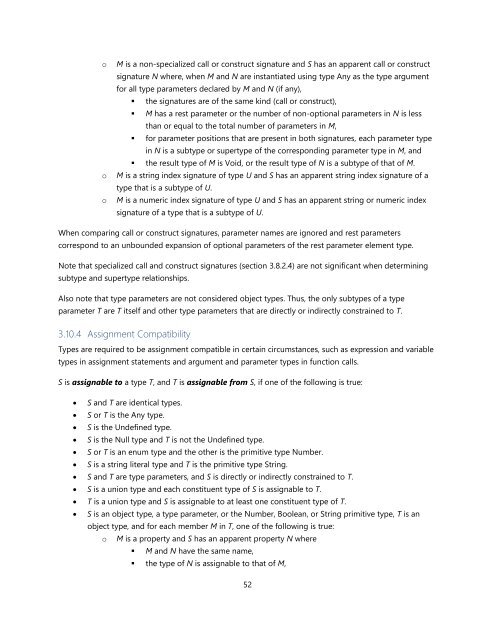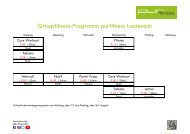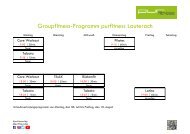TypeScript Language Specification v1.5
TypeScript Language Specification v1.5
TypeScript Language Specification v1.5
Create successful ePaper yourself
Turn your PDF publications into a flip-book with our unique Google optimized e-Paper software.
o<br />
o<br />
o<br />
M is a non-specialized call or construct signature and S has an apparent call or construct<br />
signature N where, when M and N are instantiated using type Any as the type argument<br />
for all type parameters declared by M and N (if any),<br />
• the signatures are of the same kind (call or construct),<br />
• M has a rest parameter or the number of non-optional parameters in N is less<br />
than or equal to the total number of parameters in M,<br />
• for parameter positions that are present in both signatures, each parameter type<br />
in N is a subtype or supertype of the corresponding parameter type in M, and<br />
• the result type of M is Void, or the result type of N is a subtype of that of M.<br />
M is a string index signature of type U and S has an apparent string index signature of a<br />
type that is a subtype of U.<br />
M is a numeric index signature of type U and S has an apparent string or numeric index<br />
signature of a type that is a subtype of U.<br />
When comparing call or construct signatures, parameter names are ignored and rest parameters<br />
correspond to an unbounded expansion of optional parameters of the rest parameter element type.<br />
Note that specialized call and construct signatures (section 3.8.2.4) are not significant when determining<br />
subtype and supertype relationships.<br />
Also note that type parameters are not considered object types. Thus, the only subtypes of a type<br />
parameter T are T itself and other type parameters that are directly or indirectly constrained to T.<br />
3.10.4 Assignment Compatibility<br />
Types are required to be assignment compatible in certain circumstances, such as expression and variable<br />
types in assignment statements and argument and parameter types in function calls.<br />
S is assignable to a type T, and T is assignable from S, if one of the following is true:<br />
S and T are identical types.<br />
S or T is the Any type.<br />
S is the Undefined type.<br />
S is the Null type and T is not the Undefined type.<br />
S or T is an enum type and the other is the primitive type Number.<br />
S is a string literal type and T is the primitive type String.<br />
S and T are type parameters, and S is directly or indirectly constrained to T.<br />
S is a union type and each constituent type of S is assignable to T.<br />
T is a union type and S is assignable to at least one constituent type of T.<br />
S is an object type, a type parameter, or the Number, Boolean, or String primitive type, T is an<br />
object type, and for each member M in T, one of the following is true:<br />
o M is a property and S has an apparent property N where<br />
• M and N have the same name,<br />
• the type of N is assignable to that of M,<br />
52


















